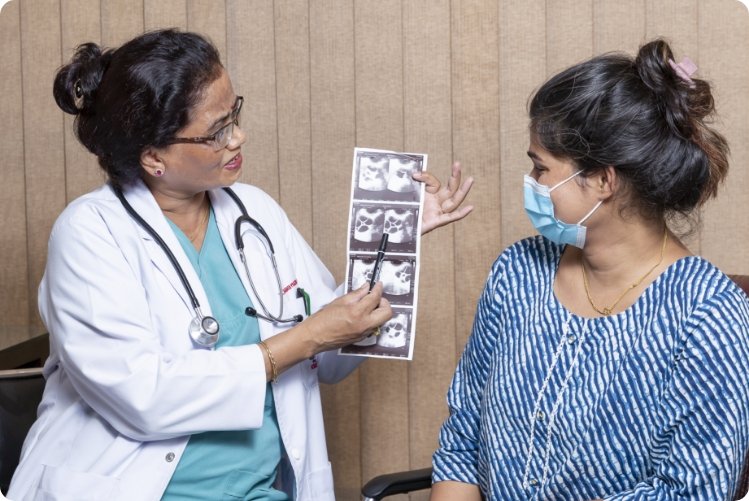Planning for a Baby
- Planning for a Baby
Female fertility
Male fertility
When to seek help
Any Questions About Fertility challenges
Call Anytime!
+977 9840187810

Introduction
The Female Reproductive System
Ovulation and Conception
- Follicular Phase: A selected egg matures in the ovary.
- Ovulation: The mature egg is released and captured by the fallopian tube.
- Luteal Phase: The uterine lining thickens, preparing for potential implantation of a fertilized egg.
Factors Affecting Female Fertility
Age:
Weight:
Medical Conditions:
- Endometriosis:This condition causes the tissue that normally lines the inside of the uterus to grow outside it, leading to pain and potentially affecting fertility by obstructing the fallopian tubes or causing inflammation.
- Polycystic Ovarian Syndrome (PCOS) PCOS is a hormonal disorder that affects ovulation. Women with PCOS often have irregular menstrual cycles, which can make it difficult to conceive.
- Fibroids: These are non-cancerous growths in the uterus that can interfere with implantation or the pregnancy itself. Depending on their size and location, fibroids can impact fertility and the ability to carry a pregnancy to term.
- Other Conditions: Conditions such as thyroid disorders, autoimmune diseases, and pelvic inflammatory disease (PID) can also negatively affect fertility.
Frequently Asked Questions
1. What is the best age for a woman to conceive?
2. How can I track my ovulation?
Tracking ovulation can significantly improve your chances of conception. Here are some methods to help you identify your fertile window:
- Basal Body Temperature (BBT): Measure your temperature with a basal thermometer every morning before getting out of bed. A slight increase in BBT (about 0.5-1 degree Fahrenheit) typically indicates ovulation.
- Ovulation Predictor Kits (OPKs): These kits detect the surge in luteinizing hormone (LH) that occurs before ovulation. A positive result indicates that ovulation is likely to happen within the next 24-36 hours.
- Cervical Mucus Monitoring: During ovulation, cervical mucus becomes clear, stretchy, and similar to egg whites. This change signifies peak fertility.
- Calendar Method: Track your menstrual cycle over several months to predict your ovulation days. Ovulation usually occurs around the midpoint of your cycle.
3. What are common signs of fertility issues?
Several signs can indicate potential fertility problems:
- Irregular Menstrual Cycles: Inconsistent or missed periods can signal ovulation issues, which may affect fertility.
- Severe Menstrual Cramps: Intense pain during menstruation might be a symptom of conditions like endometriosis or fibroids.
- Absence of Menstruation: Not having periods (amenorrhea) can indicate underlying issues such as hormonal imbalances.
- Pain During Intercourse: Discomfort or pain during sex can be associated with various reproductive health problems.
- Hormonal Symptoms: Symptoms like excessive hair growth, weight gain, or acne can indicate hormonal disorders like PCOS.
4. How does lifestyle affect fertility?
Lifestyle choices can greatly impact fertility:
- Diet: A balanced diet rich in vitamins and minerals supports reproductive health. Avoiding excessive caffeine, alcohol, and processed foods can also be beneficial.
- Exercise: Regular, moderate exercise helps maintain a healthy weight and reduces stress. However, excessive exercise can disrupt menstrual cycles and ovulation.
- Stress Management: Chronic stress can affect hormonal balance and fertility. Practicing relaxation techniques such as yoga, meditation, and mindfulness can be helpful.
- Smoking and Alcohol: Both can harm fertility. Smoking affects egg quality and quantity, while excessive alcohol consumption can disrupt hormonal balance and menstrual cycles.
- Environmental Toxins: Exposure to certain chemicals and pollutants can negatively impact fertility. Minimizing exposure to pesticides, heavy metals, and other environmental toxins is advisable.
5. What medical conditions affect fertility?
Several medical conditions can impact a woman’s ability to conceive:
- Endometriosis: This condition causes the uterine lining to grow outside the uterus, leading to pain and potentially affecting fertility by obstructing the fallopian tubes or causing inflammation.
- Polycystic Ovarian Syndrome (PCOS): A hormonal disorder that affects ovulation. Women with PCOS often experience irregular menstrual cycles and may have difficulty ovulating.
- Fibroids: Non-cancerous growths in the uterus can interfere with implantation or pregnancy, depending on their size and location.
- Thyroid Disorders: Both hyperthyroidism (overactive thyroid) and hypothyroidism (underactive thyroid) can affect menstrual cycles and ovulation.
- Pelvic Inflammatory Disease (PID): An infection of the reproductive organs that can cause damage and scarring, leading to fertility issues.
6. When should I seek help for fertility issues?
If you’ve been trying to conceive for over a year without success (or six months if you’re over 35), it’s advisable to seek professional help. Other signs that you might need to consult a fertility specialist include:
- Irregular or Absent Menstrual Cycles: Inconsistent periods or lack of menstruation can indicate ovulation problems.
- Previous Miscarriages: Recurrent miscarriages might point to underlying fertility issues.
- Known Medical Conditions: If you have a diagnosed condition such as PCOS, endometriosis, or thyroid disorders, it’s wise to seek early intervention.
- Age: Women over 35 should seek help after six months of trying due to the natural decline in fertility with age.
Our team at Creator’s IVF Nepal Pvt. Ltd. is here to provide comprehensive fertility evaluations and personalized treatment plans. We offer a compassionate and professional approach to help you navigate your fertility journey. Contact us today to schedule a consultation and take the first step towards understanding and enhancing your fertility.
Seeking Help
Enquire today
Online Booking For Appointment
At Creators IVF, we understand the importance of timely and personalized care. Book your appointment online with ease and take the first step toward realizing your dream of parenthood. Our expert team is here to guide you through every stage of your fertility journey with care and compassion.
